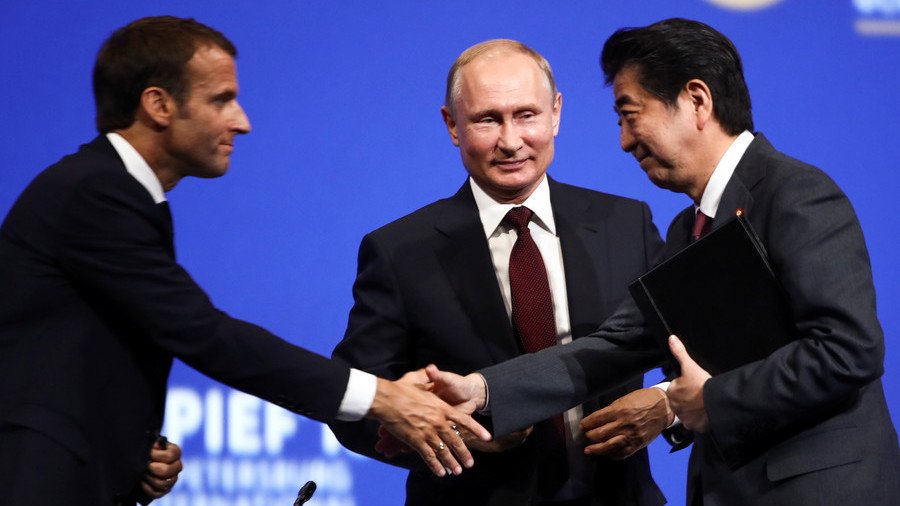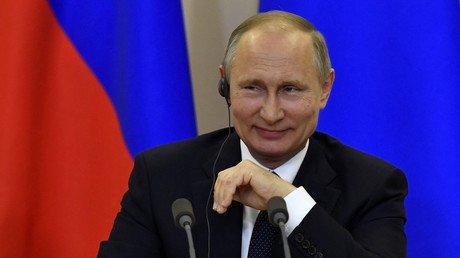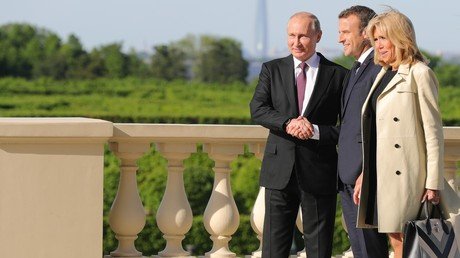The question of whether Russia is a European or Asian country, or both, has perplexed its leaders and citizens for centuries. However, French President Emmanuel Macron believes he knows the answer.
SAINT PETERSBURG - The top table at the Saint Petersburg International Economic Forum (SPIEF) hosted leaders responsible for around 30 percent of global GDP. And quite a line-up it was: Macron and Vladimir Putin, alongside Japanese Prime Minister Shinzo Abe, Chinese Vice President Wang Qishan and IMF supremo Christine Lagarde.
Indeed, there was so much collective power gathered at Friday event that Bloomberg’s John Micklethwait, who was serving as moderator, quipped how it was the result of Donald Trump’s unique ability to bring people together. However, while humorous, this was an America-centric take that missed the bigger picture.
What was really happening in St. Petersburg was a sort of tug of war, where Russians flirted with East and West as they continue to ponder on which side their bread will be buttered in the future. While Washington and its sidekicks in London don’t seem overly perturbed by Russia’s drift to Asia, France and Germany are alarmed, and representatives from both countries continuously referenced the issue at the SPIEF.
And then Macron made it clear where he stood. “Russia is an inalienable part of Europe... mistakes have been made in the past... we must work to remove our divisions on many issues,” he said.
Former German Chancellor Gerhard Schroeder had earlier warmed up to the same theme: highlighting how an energy partnership with Russia was in Europe’s vital interest. He also mocked US attempts to kibosh the proposed Nord Stream 2 pipeline, saying he wouldn’t currently look to Washington for "examples of high governance.”
Russian analysts present this week echoed Schroeder’s assertion that the Americans are wielding sanctions for business advantage. And Putin himself warned how protectionist measures could eventually lead to a devastating global crisis.
“The system of multilateral cooperation, which took years to build, is no longer allowed to evolve. It is being broken in a very crude way. Breaking the rules is becoming the new rule," the Russian president remarked.
READ MORE: Putin: Reviewing international deals with each new US election will create ‘mistrust’
Also fascinating was how discourse at the SPIEF differed from the isolationist rhetoric prevalent in London and Washington these days. Putin expressed support for free trade and investment, as well as openness to Chinese companies operating in Russia and their people moving here in tandem. Indeed, one Italian delegate remarked how the world had been turned on its head: “Thatcher and Reagan used to be the ones pushing these agendas, who would have imagined 30 years ago, Moscow and Beijing standing up for capitalist globalization?”
While Wang and Abe spoke of mutually respectful relations honed over many years, Macron was in a thoroughly different position. But the young French leader was keen to play the humble guest: beginning his speech with tributes to those in St. Petersburg who had died in the Second World War, before making a lengthy reference to Leo Tolstoy’s War & Peace.
Nevertheless, politics caught up to Macron when he praised French business for staying in Russia despite "tough times.” Because Russians present were quick to note how Paris was one of the primary drivers behind the Western sanctions that have hurt the Russian economy.
On the ground, the atmosphere was friendly. And the French descended in numbers, with leading companies from Louis Vuitton Moet Hennessy to oil major Total investing in lavish stands.
“You look at Russian culture and it’s all European: from Pushkin to Tolstoy and Rachmaninoff to Tchaikovsky. Despite the geography, this is not an Asian country, in any way,” an exhibitor from Lyon noted.
Yet the Russians are keeping their options open. Putin pointed out that, beyond the bluster, French engagement in Russia isn’t as substantial as many might believe.
“Finland’s Fortum invested €6 billion in Russia, while the whole of France invested €15 billion,” he pointedly told Macron, who had earlier said that France desired to become the largest direct investor in Russia.
Putin outlined why this target was ambitious: “trade with Europe was worth $450 billion once, now it has fallen by half. With China, trade is going to reach $100 billion soon.” That said, despite these occasional reality checks, “Vladimir” and “Emmanuel” seemed to be hitting it off.
READ MORE: Yulia Skripal looks so well everything Britain said about poisoning is in doubt – Putin
Russian business delegates wanted their officials to play all sides.
“Russia should be friends with everyone. Why should we choose?” Alina Ustinova from Rostov Oblast noted. “We are mostly European, but a bit Asian too and we must trade with all comers. Even the Americans are welcome, when they finally see sense."
"I don't see anything wrong with dancing with the French on Friday night and the Chinese on Saturday; perhaps we could even manage a Wednesday for Trump," she teased.
Bryan MacDonald for RT



